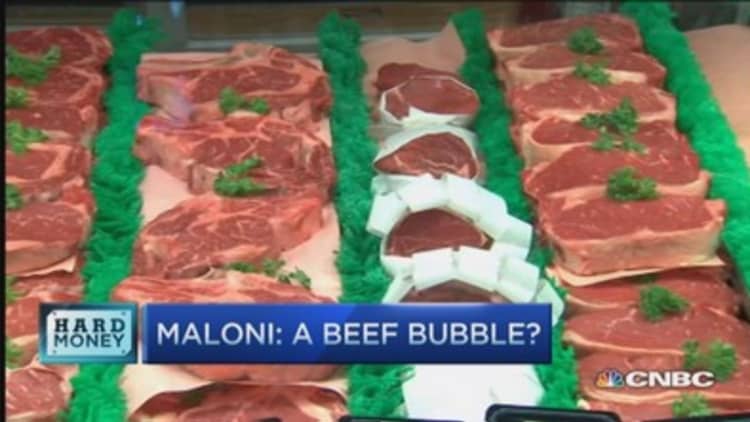India's western state of Maharashtra, home of the country's financial capital Mumbai, has introduced a draconian beef ban, which would allow for up to five years imprisonment for sale or possession of the meat.
The comprehensive beef ban, backed by the state's new Hindu nationalist Bharatiya Janata party administration, is one of the toughest attempts yet to prevent beef-eating in India, where many members of the Hindu majority, especially those of the upper castes, revere cows as sacred.
Many Indian states have laws that ban or regulate the slaughter of cows, though not all states that ban cow slaughter also ban the sale of beef products, in effect allowing the meat to be consumed if it is brought in from other states.

However, Maharashtra's law not only bans the slaughter of cows and sale of beef, but the possession of the meat, which is now to be formally considered as contraband. It also imposes the toughest punishment — of up to five years in prison — for violations.
The law, passed two decades ago by Maharashtra's state legislature, was only given the necessary assent of India's president, Pranab Mukherjee, on Monday.
Hindu nationalist groups, vocal advocates of the ban, rejoiced at the new restrictions, with Devendra Fadnavis, Maharashtra's chief minister, tweeting: "Our dream on the ban of cow slaughter becomes a reality now."
Read MoreHoly Cow! Karlie Sells for $170,000
But critics said the restrictions would prevent members of India's Muslim and Christian minorities — and other groups that have no such taboo around eating beef, including some low-caste Hindus — from accessing an important and affordable source of protein.
"It's discriminatory," said Samar Halarnkar, a senior journalist, prominent food writer and author of The Married Man's Guide to Creative Cookery. "It's a basic freedom that I should be allowed to eat what I want as long as I don't force it on anyone else's plate."
Mr Halarnkar said beef had been typically cheaper than other meats such as chicken or mutton, and that the ban might put all meat out of reach of the poor. "It's an important source of protein for those who do eat it, but now meat itself might become unaffordable," he said.
More from The Financial Times:
Commodities explained: Hedging oil volatility
UK retreat from investment banking gathers pace
Bibi's misleading Congress clapometer
Narendra Modi, prime minister, has bemoaned what he calls India's "pink revolution" of rising meat exports, and expressed hopes of bringing a national ban on cow slaughter.
India's consumption of bovine meat — including both beef and buffalo — has fallen over the past decade, as rightwing Hindu groups have campaigned to discourage lower-caste Hindus from eating it. But exports are surging, and are now estimated at about $5bn a year.
Historians say the preoccupation with stopping beef consumption is relatively modern, with many ancient Sanskrit texts documenting that beef-eating was common among Hindus.
The beef ban, which has provoked a social media storm, comes as a new Princeton University study has put the spotlight on entrenched malnutrition in India, where about 42 per cent of women are underweight when they begin their pregnancies, fuelling high rates of infant mortality and malnutrition among surviving children.

